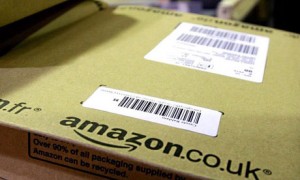 I happened upon a Bookseller piece by Agent Orange (who I’ve mentioned before) noting that UK publishers have been making a lot of noise about the putative foolishness of Amazon’s plans. It’s funny how they seem to keep doing that, and Amazon never seems to pay any attention, isn’t it? Agent Orange notes:
I happened upon a Bookseller piece by Agent Orange (who I’ve mentioned before) noting that UK publishers have been making a lot of noise about the putative foolishness of Amazon’s plans. It’s funny how they seem to keep doing that, and Amazon never seems to pay any attention, isn’t it? Agent Orange notes:
It is depressing how often we have been here before. Publishers pour scorn and disregard on Amazon. Amazon presses on with its plans regardless (announcing it is massively expanding in the UK this coming year) and a year or two later publishers discover they have lost yet more ground to the Seattle behemoth.
Gosh darn those consumers who don’t know they’re not “supposed” to be in love with Amazon anyway, right? Darned uppity peons who don’t know what side their bread is buttered on…
But just as British publishing seems to be trying not to make a big deal about anything Amazon does except in the negative sense, perhaps its reactions to potential competitors betray it. As Philip Jones notes in another Bookseller piece, so contentious is Amazon’s market dominance in the UK that the entrance of grocery chain Tesco into the e-book market is being greeted with hosannas. But will Tesco be able to compete?
The bigger test will be convincing enough of its customers to take up reading on a tablet. That said, its impact on the marketplace cannot be taken for granted. If Tesco wants to make a dent, it is going to have to be both bold and unflinching; it will need to compete on price, and back it with customer service. It must not underestimate the short-term costs of this, and it should be careful not to overestimate the medium-term rewards. It will need to treat it like a sprint, but understand that it’s a marathon.
In the end, everything will work itself out one way or another. Maybe not for the best as far as everyone is concerned, but we’ll reach some kind of new equilibrium sooner or later (until the next disruptive effect sets in, whatever that is). In decades to come, people not yet born will look back and wonder how there could ever have been this much strife over something as trivial as books, and perhaps ask their parents or grandparents to tell them what life was like back in the days when traditional publishers ruled the roost.































Of much greater importance is how Tesco is going to treat authors and publishers. Is it going to pay flat 70% royalty rate at all prices like Apple does? Or will it cheat them like Amazon does? And we’re talking about numbers big enough that “cheat” is appropriate.
Unlike Apple’s flat 70%, Amazon pays grossly substandard 35% royalties for ebooks priced from $0.99-1.99 or more that $9.99. It also charges grossly inflated download fees for ebooks priced $2.99-9.99. Amazon’s download fee, charged to authors and publishers, is roughly 100 times as much per megabyte as what it charges its AWS subscribers for file downloads. It’s a giant ripoff. Tort lawyers might even look at that 100 times and call it fraud.
From an author’s perspective, Amazon is always the bad guy. It’s the Scrooge that wants to keep writers hungry, cold and desperate. There’s simply no price an author can set where Apple doesn’t pay more for each sale, and at many prices, Apple pays twice at much.
If memory serves me correctly, Amazon paid even less in author royalties before Apple entered the market. If Amazon can drive down Apple (with the help of the DOJ) and achieve for ebooks the same market dominance it apparently now has for Audible audiobooks, look for it to do what it recently did with Audible and slash royalty payments still further.
Keep in mind that, by paying authors a pittance and demanding that they sell for no lower price elsewhere, Amazon is also forcing ebook prices up, thus cheating consumers. Amazon is using its market dominance and substandard royalties to fix ebook prices higher. And where is the DOJ in all this?
That’s why I’m perhaps less impressed that Chris by Amazon’s aggressiveness. When your business model is a 19th century robber baron, winning is easy. My own back of an envelope calculations suggest that, taking into account economies of scale, Amazon is pocketing about twice as much per ebook sale as Apple and is doing so totally at the expense of authors and publishers. Jeff Bezos’ billions is, quite literally, built on the backs of authors who can’t afford to take their kids out for a Happy Meal and MacDonalds.
That’s why Amazon moving into the UK as aggressively into the UK as it is in the U.S. is not good for authors there or for American authors selling there. It’s bad news through and through.
One final comment. I don’t fret “traditional publishers” or sneer because they no longer “rule the roost.” (I’m not sure they ever did.) I’ve got enough sense to know that in the ebook market of today they and I compete on an almost level playing field. It’s Amazon that playing the bully and Amazon’s that’s shortchanging authors. If Tesco will pay authors like Apple does, they’ve have my support.
Well, drat.
Michael just Amazon-jacked another comment section.
Funny how 35% is a ‘pittance’ when it’s roughly twice the maximum royalties that traditional publishers ever paid anyone but the best-selling and most aggressively-represented authors. No doubt the time will come when the JK Rowlings of the literary world can negotiate independently with Amazon for higher rates; but as for the small fry, I think they’re already getting a pretty good deal.